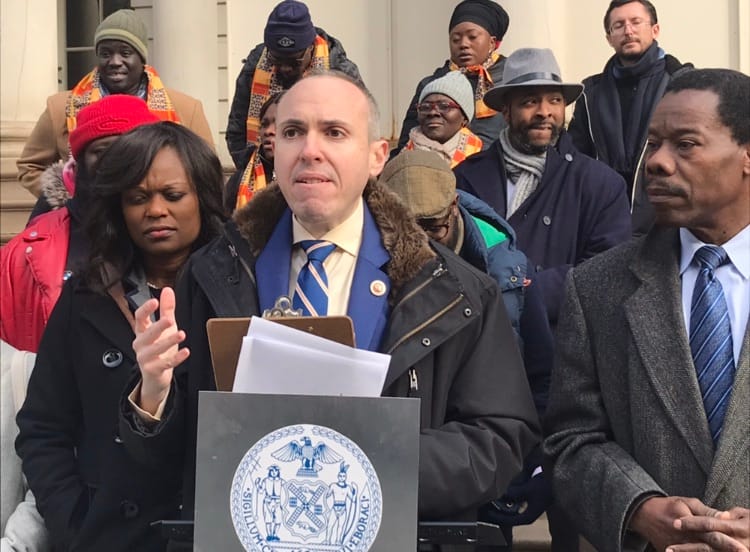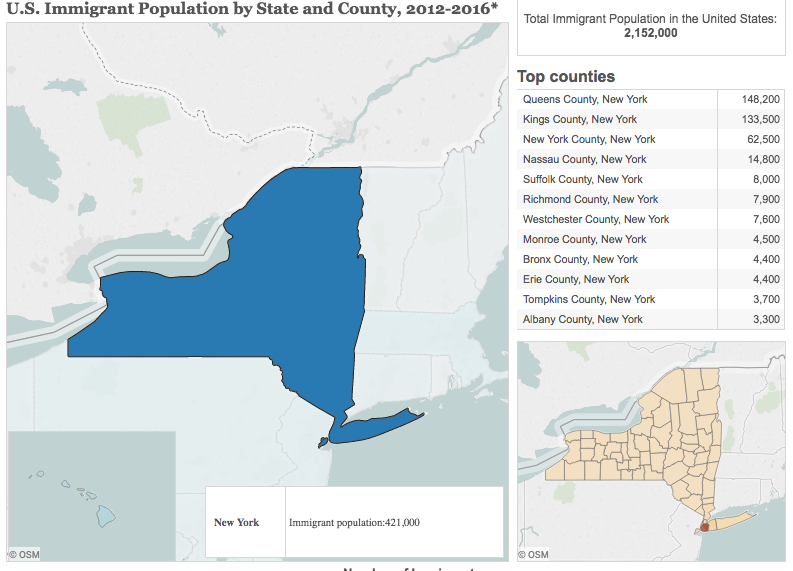What Do We Want? Language Access!

City Councilman Mark Treyer called for more language access on the steps of City Hall on Wednesday after Russian- and Haitian Creole-language translators stayed outside in the rain on Election Day last month.

In October, Mayor de Blasio announced the city would provide 86 polling sites with Russian- and Haitian Creole-speaking translators. Similar to the year before, translators had to stay outside, more than 100 feet away from the polling site as per the Board of Elections mandate.
To date, only Spanish, Chinese and Bengali speaking translators are allowed to stay inside polling sites on Election Day. Although all others can escort voters inside.
“This is inhumane, unjust and illogical,” said Treyger. ” These interpreters and our community deserve to be treated with basic dignity and respect.”
A representative from the non-profit that provided the service said they were prepared for a shortage of workers who bailed when they understood they would be outside in the rain. The Langalo, Inc. representative, who did not want to use her name, also said some translators felt they weren’t as helpful as they could have been because most voters don’t see them when they’re entering the polling site.
Treyger blames the Board of Elections for shutting the doors on certain translators and called it an “arbitrary capricious decision by the BOE.” The Councilman said he would consider suing to ensure all New Yorkers have equal language access and says he has spoken to the Council’s attorneys about the issue.
He’s wouldn’t be the first.
In 2013, Bengali residents in Queens sued to finally get translation assistance. Attorneys used the argument that since Bangladesh is located in South Asia, Bengali voters are entitled to the same privileges as Chinese voters awarded during the Voters Rights Act of 1965.
Assemblywoman Rodneyse Bichotte also spoke at the rally. Bichotte said she would introduce on the state level for communities outside of the city where there is a concentration of voters with limited English proficiency.

Brooklyn’s Haitian population was at 133,500 in 2016, according to a D.C. think tank, Migration Policy Institute. There were approximately 120,000 Russian speakers in NYC with limited English proficiency and approximately 50,000 Haitian Creole speakers as of 2016.

A week ago, Treyger introduced Int. 1282, a bill that would require Voter’s Assitance Advisory Commission to provide interpreter services for the 10 most commonly spoken languages in the city. City Councilmembers Brad Lander, Justin Brannan, Jumanne Williams, and Mathieu Eugene are co-sponsors.
The Mayor’s Office of Immigration Affairs also gave a nod toward the legislation. They sent Bklyner the following statement:
“We’re committed to making voting an easy process for New Yorkers and support the goal of having interpreters inside polling sites,” said Raul A. Contreras, a spokesperson from the from the Mayor’s Office of Immigration Affairs. “We look forward to reviewing the specifics of this legislation and working together with our colleagues in government to ensure a more accessible and equitable voting experience for all.”
All that stands in the way is the Board of Elections, it seems, who did not respond to questions about the issue before post time.




